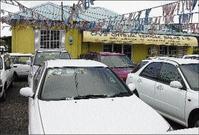Sabrina N. Gordon, Business Reporter
Used cars on a dealer's lot. When buying a used car, also consider the availability of parts, the resale value of the car, and the fuel efficiency of the model, in addition to financing. - File
If you are strapped for cash, then you may want to consider a used-car purchase rather than a new vehicle. There are two options available when deciding to buy a used car: Pay in full or get a loan.
Debt financing or a loan may be the optimal solution, taking into consideration your income constraints.
But, servicing these loans in the current high-interest rate environ-ment can be expensive and a drain on monthly income.
The answer is to shop around for the best deals on loans.
The commercial banks and credit unions are among the more popular options. The banks have larger cash pools from which to lend, but there are some credit unions with deals that offer lower interest rates and easier repayment terms.
Checks by Sunday Business with three credit unions resulted in quotes ranging from a low of 17 per cent to a high of 22.5 per cent. This is in comparison to three commercial banks charging rates as low as 19.25 per cent to a maximum of 19.75 per cent.
Consider loan terms
Looking at these rates, one would be inclined to take a loan from the institution with the lowest rate, but the loan terms must be given equal consideration.
The credit union with the lowest rate from among the institutions sampled was the University of the West Indies (UWI) Credit Union. Their rates range between 17 - 17.5 per cent, depending on whether the applicant would be repaying via salary deduction or over the counter.
This distinction affects the repayment period for the loan and the percentage value of the car that would be financed.
Using a 2002 year model car, for over-the-counter repayment, the credit union will finance only 75 per cent of the forced sale value - that is the value of the car if was to be sold at the time of the loan application.
The period given to repay the loan will also be shorter - four years.
This is in comparison to a five-year repayment period and 90 per cent financing if you are paying by means of salary deduction.
The borrower is also required to have between 16.5 per cent and 25 per cent of the value of the car in his or her share account when making the loan application, plus a 10 per cent requirement savings amount.
Under these terms, a borrower would be making a monthly repayment of approximately $12,426.29 via salary deduction and $24,721.13 for over-the-counter repayment.
Churche Credit Union, at the upper end of the scale charges, 22.5 per cent, with a five-year repayment period for the same-age car.
Churches, too, requires borrowers to pay a minimum of 10 per cent share contribution and will finance up to 90 per cent of the value.
Monthly payment in this case would amount to about $12,556 for a five-year-old car valued at about $500,000.
COK Credit Union charges 19.5 per cent and offers similar terms, that is 90 per cent financing with five years to repay. Your loan would attract a monthly payment of $12,977.
The most attractive option in this case would be UWI, that is, if you can afford the higher 25 per cent that you would be required to front.
Among the commercial banks sampled, Scotiabank had the lowest rate of 19.25 per cent on used-car loans.
The bank only recently cut the rate from 22.5 per cent as it goes after a bigger share of the used-car loans market.
National Commercial Bank (NCB) was just slightly higher, with 19.35 per cent, followed by FirstCaribbean International Bank with 19.75 per cent.
Under the NCB automotive loan, the borrower can get access to financing up to 90 per cent.
A five-year-old car, however, is financed at 70 per cent, with monthly repayment of $10,529.79 for four years on a car valued at $500,000.
This is in comparison to FirstCaribbean International Bank with a monthly repayment of $18,521.88 over three years for the same age and value car.
Persons other than First-Caribbean customers can get access to these loans, but only 65 per cent of the forced sale value is financed.
Note that while the monthly payment for loans from the credit unions seems to be more affordable, one has to be a member to access the benefits.
On the other hand, non-customers can qualify for used-car loans from the various commercial banks.
The age of the car also matters, as some financial institutions will not accept a car older than five years as collateral for the loan.
Note, too, that the financial institutions will take out a lien on the vehicle title until the loan is repaid.
Beyond the financing, one should also consider the availability of parts, the resale value of the car, and the fuel efficiency of the model before purchase.
sabrina.gordon@gleanerjm.com

